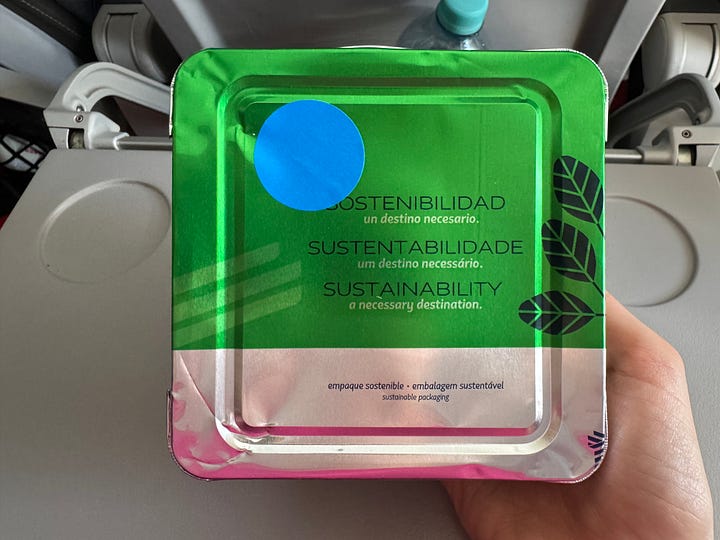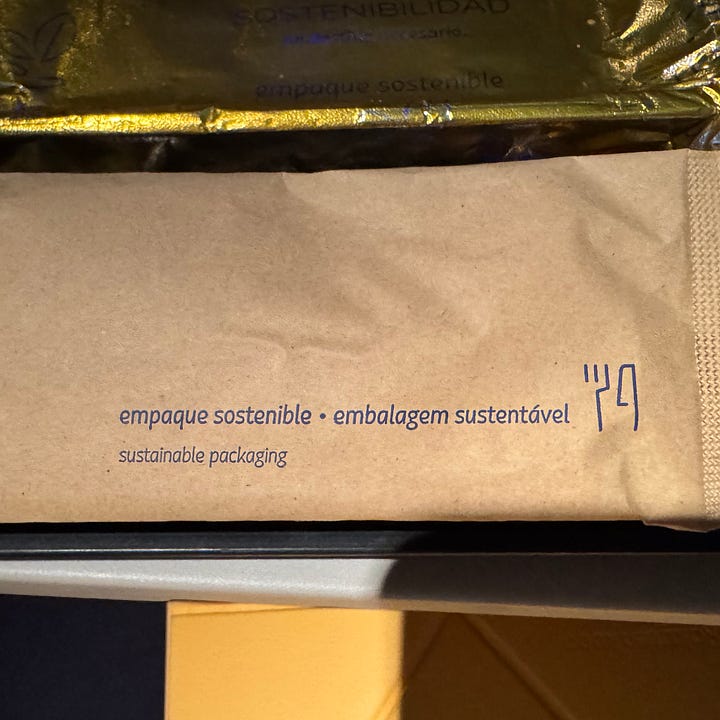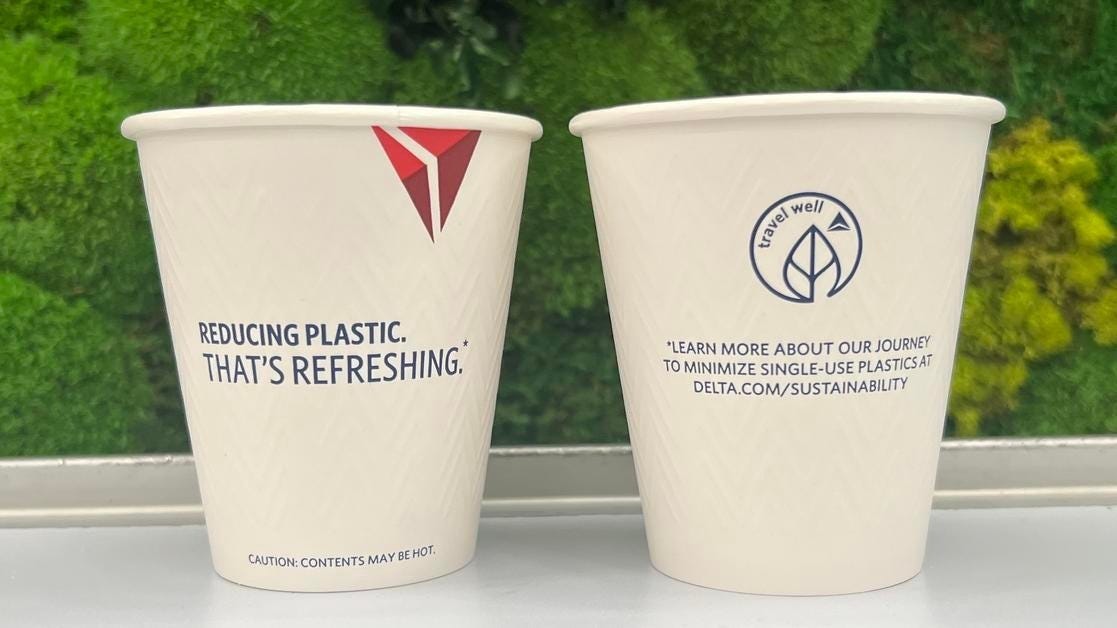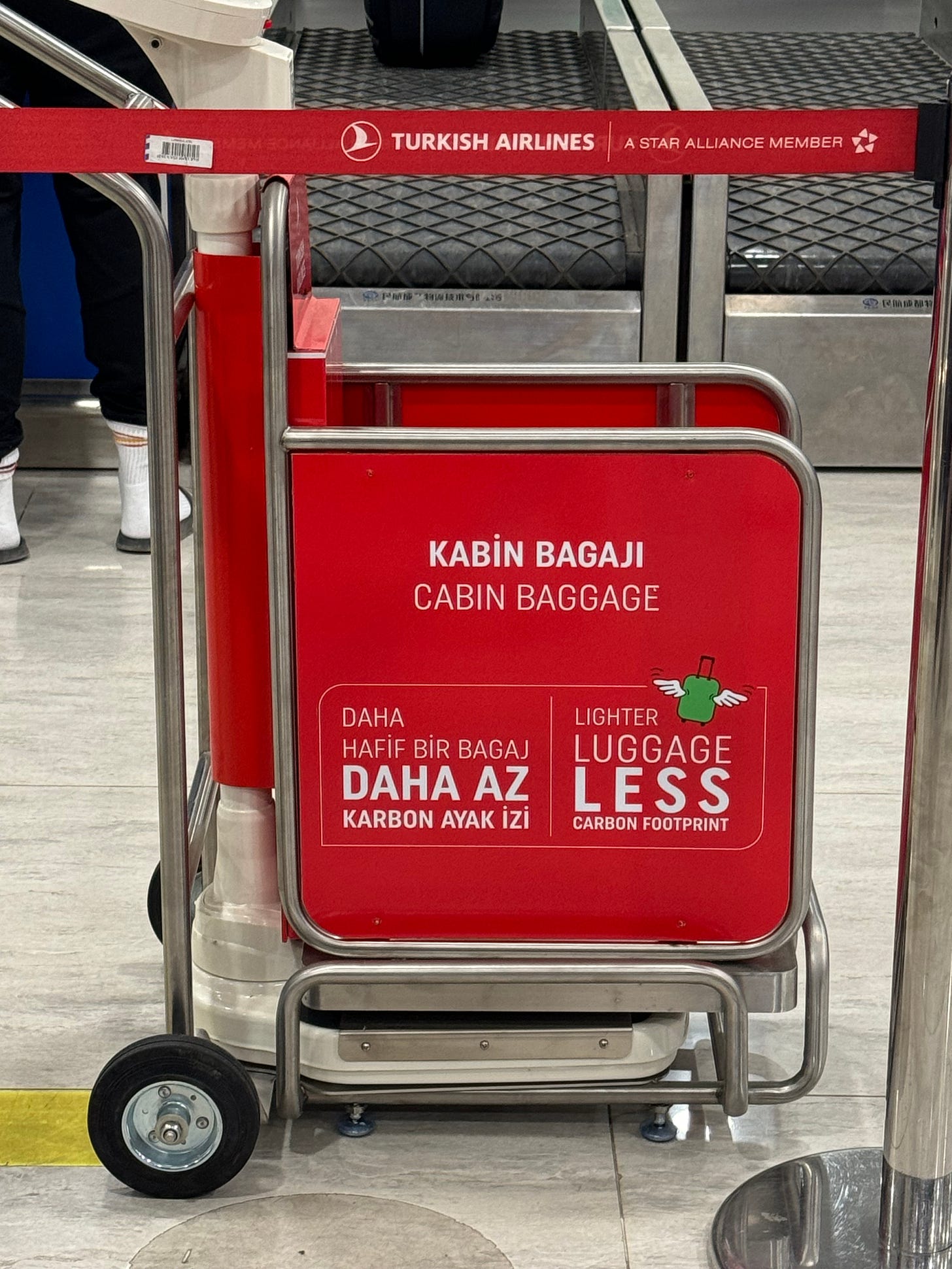TCC #63 — Trivialising sustainability
The damage we do when we focus on trivial climate solutions
Hi communicators,
I just recorded a sustainability reporting masterclass with my friend
over at Touchline Earth. (If you’re interested in sports and sustainability, check out his Substack.)One of the things we talk about in the masterclass is avoiding brownwashing. I’ve written about brownwashing before, and I still don’t like the term, but it’s basically what happens when companies focus their sustainability communications on some tiny, trivial detail rather than talk about the elephant in the room: their real climate problem, which is usually Scope 3 emissions, or their entire business model, or hey — the fact that hardly any of them pay taxes.
Here’s a classic example of brownwashing: Delta’s recyclable cups.
Delta ran a whole PR campaign around the fact that it was introducing sustainable cups on flights. Big woop! What about your carbon footprint?
Airlines are the worst for this. Check out the obnoxious sustainability labelling on these single-use cutlery and food packages.


The reason brownwashing bothers me so much (and should bother everyone) is not just that companies are misguided with regard to material issues. I don’t believe Delta really thinks its cups are a pressing concern, and somehow that makes all of this so much worse. It’s the magician’s trick of misdirection at work: pull their eyes over here, to the scantily-clad magician’s assistant, so they don’t see what I’m really doing back here.
Brownwashing is a major way that companies trivialise their sustainability efforts. They think we’ll be appeased by hearing an airline talk about cups, or cutlery, or bag tags (I got a 100% paper one the other day, thank God!). They turn what is a legitimate global crisis into a feel-good afterthought — and then they want to be praised for it.
There’s another way companies trivialise their sustainability efforts, and this one doesn’t have a term that I know of. It’s when companies make a change motivated by other desires (say, cost-cutting or efficiency measures), and then the marketing team gets involved, and realises that they may be able to spin this as a sustainability thing.
Unless you’ve got a better term (please, let me know), I think I’ll call this greentagging — basically, putting a green tag or claim on something that really was never about the planet.
Let’s check out some examples from my absolute favourite greenwasher, Turkish Airlines.
Here’s a sign taped to the check-in desk: You may save the environment by getting your boarding pass with SMS at our counters.
Obviously this is absurd. Eliminating boarding passes will not save the environment (but eliminating Turkish Airlines might). If anything, the infrastructure needed to send and receive SMS is probably more damaging than a few paper passes. I don’t know — I’d like to see that study. But as my partner said to me after we laughed about this sign: Why did they bother making this sound like a sustainability initiative when it’s clearly just a cost-cutting mechanism for the company?
Bingo.
Now I don’t know, maybe Turkish Airlines’ sustainability team did sit around and determine that boarding passes were at the top of their materiality assessment. But I doubt it. More likely, another department came up with a plan for digital disruption (ew!), the marketing team (who still have email signatures that say Please consider the environment before printing this email) got their hands on it.
The reason I’m far more inclined to believe this version of events is because Turkish Airlines does this all the time. Just look at this classic example — the bag-weighing station that encourages customers to pack lighter to save the planet.
Don’t mess with us, Turkish Airlines. Lighter luggage means less jet fuel for you, not a less carbon footprint for us. But even if this dumb message somehow saved you 10 cents on jet fuel — was it worth it? Why not just print the cost of your overweight luggage fines on there instead? It would be far more effective.
Anyway, what’s the real problem here?
The problem is that the more we (call us consumers, if you must) see trivial sustainability claims like this, the more two things happen. The first, if we’re not particularly climate-literate, is that we’re duped into thinking that Turkish Airlines is great for the environment. The second, if we are climate-literate, is that we think Turkish Airlines is an absolute joke. We see straight through the greenwashing, and it makes us sick. We’re tired of an enormous environmental and human crisis somehow being solvable by SMS boarding passes and wooden single-use cutlery on long-haul flights.
That means we start to tune out. We don’t take anything you say seriously anymore. And when, finally, you do actually figure out a sustainable way to operate an airline, it’s going to take a long time and a lot of proof for us to believe you again.
It’s all greenwashing, at the end of the day, but companies are getting so good at it that now we need a whole glossary of terms to figure out which exotic blend of greenwashing they’ve chosen today.
If this depresses you, it should also remind you of the importance of climate communicators. We need more people who a) understand climate change and b) stick to their guns when facing pressure from marketing teams and leadership to spin the story. Being a good climate communicator means understanding what matters: whether it’s knowing just how much technical detail to give a lay audience, or refusing to devote half a sustainability report on LED lightbulbs when the company still hasn’t addressed its Scope 3 emissions.
That’s all from me today, folks.
Stay sane.





